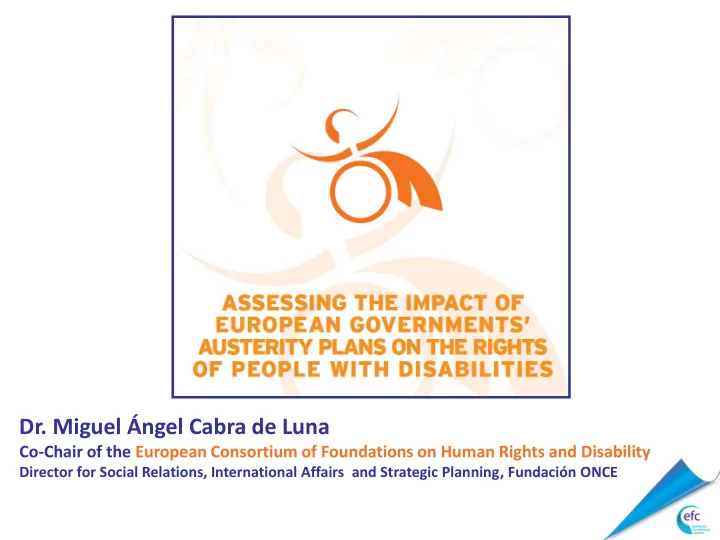

Dr. Miguel Ángel Cabra de Luna Co-Chair of the European Consortium of Foundations on Human Rights and Disability Director for Social Relations, International Affairs and Strategic Planning, Fundación ONCE
European Consortium of Foundations on Human Rights and Disability • The European Consortium of Foundations on Human Rights and Disability brings together funders and other stakeholders committed to promoting the implementation of the UN Convention of the Rights of People with Disabilities ( UNCRPD ). • The Consortium is a project of the European Foundation Centre (EFC), a membership association based in Brussels representing public benefit foundations at European level. • Goal: to breathe life and vigour into the application of the UN Convention in Europe; and to mobilise the foundation sector to play a catalytic role in ensuring that European governments and other relevant stakeholders commit to and support both the ratification and implementation of the Convention.
BACKGROUND Since the onset of the economic crisis in 2008, concerns have been raised by all interested parties on the negative impacts for people with disabilities and their families. The European Consortium of Foundations on Human Rights and Disability decided to commission this study in order to gather evidence and data on how the current economic crisis, especially the cuts made by a number of European governments, has impacted persons with disabilities and their families.
SCOPE AND METHODOLOGY Reference frame a) UN CRPD b) EU Disability Strategy 2010-2020 c) Europe 2020 Strategy Focus a) A. ‘social services’ i. Employment and vocational rehabilitation ii. Health and social care services iii. Independent living iv. Education and vocational training b) B. ‘social security’ for people with disabilities March – October 2012 Results a) A. European study b) B. Country studies: Greece, Hungary, Ireland, Spain, Portugal and U.K
KEY FINDINGS 1. A wide range of austerity measures was identified: a) Direct budget cuts b) Closure and merging of services c) Cuts in staffing, pay and conditions d) Cuts in independent living support e) Delays in payments f) Postponement of developments and reforms g) Increased waiting lists h) Increased outsourcing of services i) More standardised and/or institutional services j) Lack of resources on inclusive education support 2. Disability-related social security payments and benefits in kind have been reduced through direct cuts and through a number of indirect mechanisms , which result in de facto reductions in the value of the payments. 3.More than 1 out of 5 persons with disabilities (21.1%) are at risk of poverty in the EU compared to people without disabilities (14.9%). The situation of women is worse compared to men for both women with disabilities and without disabilities.
KEY FINDINGS. ITALY 1. The participation of persons with disabilities in the labour market has decreased in the EU since the onset of the economic crisis. 2. Public social services financing and provision is being very seriously curtailed in Member States such as the Baltic states, Bulgaria, Greece, Hungary, Ireland, Italy, Portugal, Romania, Spain and the UK. 3. Drastic reduction of the local budget allocations for social (care) spending in Italy and the UK 4. The very precarious financial situation of local governments in Italy has been reported 5. Increased inequalities 6. Increased responsibilities of families and end users in the financing and provision of services 7. The long term care sector in Italy has been harder hit by austerity measures than the health sector.
CONCLUSIONS Now is not a time to move The study shows that the backwards in the field of economic crisis , as disabilities, instead we must well as the political and aspire to do even better. This social decisions taken as a means collaborating more result of it, is closely than ever before with one undermining the another, and looking for creative fundamental civil, and alternative avenues, such as political, social and social innovation and economic rights of people with disabilities and their entrepreneurship . families. We need to come up with solutions that allow us to continue the track along which we started some years ago to achieving social inclusion of people with disabilities.
THANK YOU! Download the key findings, the full European report and the six countries report from the EFC website: http://www.efc.be/news_events/Pages/austerity- measures.aspx Or contact us at efc@efc.be
Recommend
More recommend